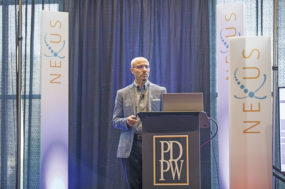I visited with my daughter’s English teacher today.It was one of those parent-teacher conversations where you find out what’s missing in the grade book. “There’s only one assignment missing. She needs to write an essay about how she feels about liberty and turn it in by Monday. That will bring up her grade.”
She perched on the desk, her beautiful dark brown hair framing her face. Her lips pouted. “I’m going to be late for lunch, Mom.”
I looked at her and said, “You can go now.”
“Does that mean I get to go on my date on Friday?” She stood up and started for the door.
“When I have the assignment in my hot little hand,” I answered curtly. Her face fell, and she sauntered out the door. She knew that the date on Friday hinged on her performance. Her freedom was at stake.
Perhaps I was overstepping my bounds as a parent. Maybe she should be able to do anything and everything she wants. If she wants to flunk English, isn’t that her choice? I should not interfere with her life. After all, isn’t she free?
After school, my daughter and I started talking about liberty. I thought of the maxims, “Freedom isn’t free,” “There is no freedom without law,” “There is no liberty without sacrifice,” “Freedom is bought with a price.” I wondered if she understood, and then I began to wonder if I really understood. What is freedom?
According to my kids, freedom is the inalienable right to do whatever they want! There should be no curfews, laws or restrictions. Teenagers are all-wise and all-knowing. It has been suggested that teenagers should be sent to college when they turn 13 because they know everything and no one would miss them while they were gone.
It is a fine line that parents walk. How much freedom do you give a teenager these days? When I was a kid, I didn’t have many restrictions placed on my freedom, but we lived outside of nowhere, and there wasn’t much trouble waiting for me out in the pine trees or at the ultra-G-rated movie in the church house. My parents didn’t bug me about my grades, and they didn’t worry too much unless I didn’t report in when I came home from a dance or an activity. We had curfews and rules, and I was expected to obey them, and I did without question.
Nowadays, teens step out the door into a jungle of choices. They need to have a navigation map just to avoid the quicksand of sleaze and filth that permeates our society. One misstep could ruin their lives forever! Everything matters to the N-th degree.
Grades can keep you out of college and ensure the failure of a future career. Poor grades can lead to poor friends, and poor friends can lead you to places you don’t want to go. Just letting a teen seek their own level is dangerous and heartbreaking. What is a parent to do?
This freedom issue isn’t an easy one. God just sits up there and looks down on us without directing traffic. He lets us do about what we want. Right? I don’t think so!
Let’s take a look at the story of Moses and Pharaoh. Now there are a few problems with the Pharaoh story. The Biblical account in Exodus 9:12 says, “The Lord hardened Pharaoh’s heart.” I used to think that God wasn’t being fair with poor Pharaoh. Not only did He give him these terrible consequences, but He made Pharaoh make the bad choices. As I have raised my teen, I have come to realize that just by a couple of words and a look, I can harden my children’s hearts. They tune me out, and they are more determined to do exactly what I have told them not to do. It’s not because I made them do it, but their reaction to what I said hardened their hearts against me. Since I sent the first message to my child, it could be said that I hardened his or her heart. I suspect that was the case with the Lord and Pharaoh.
The Moses and Pharaoh story is such a good example of what parents go through with rebellious teenagers who think that freedom is an inalienable right to do whatever they wish, with no consequences attached.
As I remember the story, the Lord sends Moses to Pharaoh with a message, “Let my people go.” The message is straightforward and comprehensible, and Pharaoh understood it in his own language. Moses, after all, had been raised in the same house.
Pharaoh leans back on his throne and says with some assurance, “Make me!”
And the Lord proceeds to do just that. First comes the snake. In essence, the Lord says with the miracle, “I will show you my power.” This should have impressed Pharaoh, but his magicians who could create illusions to fool the eye, said, “We can do that, too! Ha Ha! See there! That is nothing!”
Pharaoh fairly gloated as his magicians showed their magic. Pharaoh probably thought he had won, but when Moses’ serpent ate up the serpents of the magicians, he should have noticed that the Lord’s power was greater than his, but he didn’t.
Plague after plague, or in our terms, consequence after consequence, the Lord tried to help Pharaoh redirect his course. He turned water into blood. He sent frogs, lice, disease, boils, hail and locusts. Finally, He filled the earth with darkness and allowed the death of all the firstborn. Pharaoh, like the monkey who has his hand in a jug holding a prize, would not let go.
Did Pharaoh have his freedom? He sure did. At any time he could have said, “Hey, Moses, I don’t really need those slaves, take them into the wilderness.” But his pride kept him from doing that. He lost nearly everything because he was unwilling to bend. He wanted to maintain his so-called freedom, even if it meant defying God.
The Lord works with us in much the same way as he did with Pharaoh. When we are going down a wrong path, the Lord often gives us a consequence to remind us that we are making a wrong choice. For example, if we tell a lie, the need to hide that lie is very strong. We don’t want anyone to find out. We spend our time fabricating scenarios that will absolve us from the consequence. One lie leads to another and another. Gradually we weave ourselves into a trap. It’s like the spider and the fly. Except we are the spider and the fly. Our weaving leads to our own demise.
Jesus, when speaking with some of his followers said:
“If ye continue in my word, then are ye my disciples indeed; And ye shall know the truth, and the truth shall make you free.
They answered him, “We be seed of Abraham, and were never in bondage to any man: how sayest thou, Ye shall be made free?”
Jesus answered them, “Verily, verily, I say unto you, Whosoever committeth sin is the servant of sin” (John 8: 31-34).
Jesus did not pull any punches. He said it like it is. He, in effect, was saying, “No matter who you are, there are rules, and any infraction of the rules will put you in slavery.”
Freedom isn’t the ability to do anything we want. Freedom is learning the rules that lead to freedom and obeying those rules. Any kind of deviation from the rules, will result in consequences and consequences lead to less freedom. The higher the law we break, the worse the consequence. Some teens will say, “I have told lies, and I got away with it,” “I have cheated on tests, and they never found out,” “I have tried drugs, and it never fried my brain,” and “I slept with lots of people, and I didn’t get AIDS.”
All I can say is, “You are not at the end of your life.” Someone said, “God doesn’t balance the books at the end of each day.” Sometimes we will go for years before the plagues come. Sometimes they will come in the instant we make the wrong choice, but they will come, and the longer we ignore the warnings, the tougher the consequences. That is the message of Pharaoh’s story.
Pharaoh was the richest man in the world and he was brought to his knees, losing much because he didn’t heed the warning.
So my daughter will write her essay on freedom before she goes to the dance. She will be twice blessed. First, she will have a daunting project out of the way, and she will feel the triumph of having accomplished something worthwhile.
I tell my children, “Yes, you can do anything you want, but I can make your life difficult enough you won’t want to do something wrong.” I tell them and stick to it because I love my children, and I fear the world out there. Pharaoh’s plagues don’t hold a candle to what they face, if they allow the world to be in charge. PD
By Yevet Tenney




